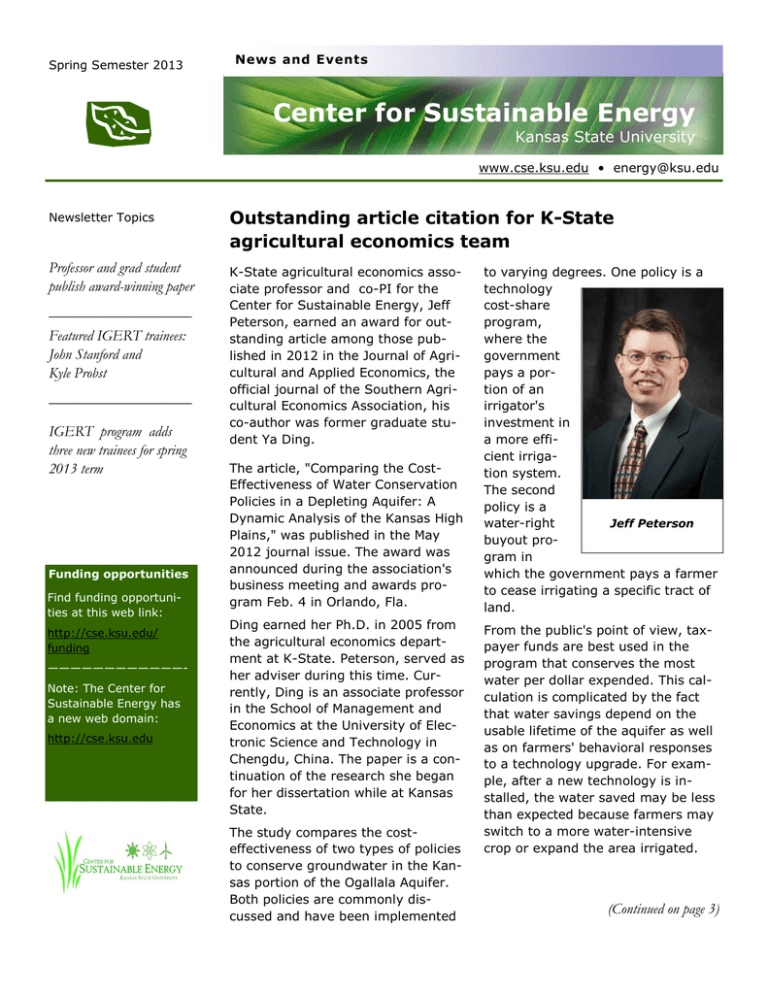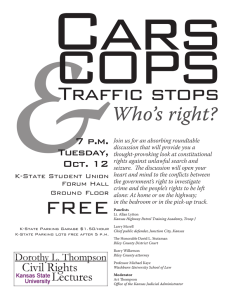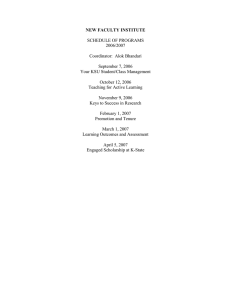Center for Sustainable Energy Outstanding article citation for K-State agricultural economics team
advertisement

Spring Semester 2013 News and Events Center for Sustainable Energy Kansas State University www.cse.ksu.edu • energy@ksu.edu Newsletter Topics Outstanding article citation for K-State agricultural economics team Professor and grad student publish award-winning paper K-State agricultural economics associate professor and co-PI for the Center for Sustainable Energy, Jeff Peterson, earned an award for outstanding article among those published in 2012 in the Journal of Agricultural and Applied Economics, the official journal of the Southern Agricultural Economics Association, his co-author was former graduate student Ya Ding. ___________________ Featured IGERT trainees: John Stanford and Kyle Probst ___________________ IGERT program adds three new trainees for spring 2013 term Funding opportunities Find funding opportunities at this web link: http://cse.ksu.edu/ funding ————————————Note: The Center for Sustainable Energy has a new web domain: http://cse.ksu.edu The article, "Comparing the CostEffectiveness of Water Conservation Policies in a Depleting Aquifer: A Dynamic Analysis of the Kansas High Plains," was published in the May 2012 journal issue. The award was announced during the association's business meeting and awards program Feb. 4 in Orlando, Fla. Ding earned her Ph.D. in 2005 from the agricultural economics department at K-State. Peterson, served as her adviser during this time. Currently, Ding is an associate professor in the School of Management and Economics at the University of Electronic Science and Technology in Chengdu, China. The paper is a continuation of the research she began for her dissertation while at Kansas State. The study compares the costeffectiveness of two types of policies to conserve groundwater in the Kansas portion of the Ogallala Aquifer. Both policies are commonly discussed and have been implemented to varying degrees. One policy is a technology cost-share program, where the government pays a portion of an irrigator's investment in a more efficient irrigation system. The second policy is a Jeff Peterson water-right buyout program in which the government pays a farmer to cease irrigating a specific tract of land. From the public's point of view, taxpayer funds are best used in the program that conserves the most water per dollar expended. This calculation is complicated by the fact that water savings depend on the usable lifetime of the aquifer as well as on farmers' behavioral responses to a technology upgrade. For example, after a new technology is installed, the water saved may be less than expected because farmers may switch to a more water-intensive crop or expand the area irrigated. (Continued on page 3) Page 2 Featured IGERT Trainees I-STAR, an integrated interdisciplinary graduate program for achieving advances in the development of next-generation biorefineries, selects associates and trainees to work within interdisciplinary teams toward solutions of integrated problems in three major bioenergy-related areas: technology, agriculture and socio-economic issues. I-STAR participants are paired with faculty members and undergraduate researchers to form core research teams addressing scientific barriers facing sustainable biorefineries. John Stanford Chemical Engineering In 2010 I completed my bachelor’s degrees in biomedical engineering and music performance, with a minor in mathematics, at the University of Iowa. My engineering studies focused on biological signal/data collection and analysis and medical device/implant design. My main project was the design and construction of a device used for the rapid detection of hemozoin, a by-product of malarial infection, in a blood sample. My musical studies were classical double-bass performance. The past year I have worked for a company that manufactures chemicals for medical uses. My growing interest in chemistry over the past several years is what led me to the chemical engineering graduate program at K-State. My IGERT mentor is Dr. Mary Rezac from the department of chemical engineering. The National Science Foundation is funding the K-State Integrative Graduate Education and Research Traineeship (IGERT) program. For more information, visit: http://igert.ksu.edu Co-directors Ron Madl 785-532-7022 rmadl@k-state.edu Mary Rezac 785-532-5584 rezac@k-state.edu Educational Programs 785-532-2029 rutlin@k-state.edu Center Office 785-532-4995 energy@k-state.edu Kyle Probst Grain Science and Industry I earned my B.S. and M.S. from Purdue University in food science in 2008 and agricultural systems management in 2010, respectively. At Purdue, my research focused on developing a novel granulation process to enhance the handling and transportation of distillers’ grains from corn ethanol production. I also had the opportunity to work on developing a sustainable, reduced-waste food process for the tortilla manufacturing industry. Currently, I am a Ph.D. student working in the BIVAP program within KState’s grain science and industry department. My research project will investigate the production of single-cell oils from renewable materials that can be used as input for advanced biofuels. Additional research interests include sustainable, integrated processing for the food and biofuel industries, and bio-fermentation for value-added products and co-product utilization. My IGERT mentor is Dr. Praveen Vadlani from the department of grain science and industry. The Kansas State University Center for Sustainable Energy, through research and educational efforts, seeks to provide sustainable, renewable energy while maintaining the environment and providing an adequate food supply. K-State offers significant educational and scientific resources related to the complete cycle of biofuels production. Basic and applied research, education and outreach activities are components of the center. Center activities involve more than 30 faculty from across campus, including representatives from the agriculture, arts and sciences, and engineering colleges. K-State Notice of Nondiscrimination. Kansas State University is committed to nondiscrimination on the basis of race, color, ethnic or national origin, sex, sexual orientation, gender identity, religion, age, ancestry, disability, military status, veteran status, or other nonmerit reasons, in admissions, educational programs, or activities and employment, including employment of disabled veterans and veterans of the Vietnam Era, as required by applicable laws and regulations. Responsibility for coordination of compliance efforts and receipt of inquiries concerning Title VI of the Civil Rights Act of 1964, Title IX of the Education Amendments of 1972, Section 504 of the Rehabilitation Act of 1973, the Age Discrimination Act of 1975, and the Americans With Disabilities Act of 1990 has been delegated to the director of Affirmative Action, Kansas State University, 214 Anderson Hall, Manhattan, KS 66506-0124, 785-532-6220 or TTY: 785-532-4807. New IGERT trainees for spring 2013 Nana Baah Appiah-Nkansah Department: Biological and Agricultural Engineering My present research focuses on catalytic Page 3 upgrading of bio-oil using polymeric membranes. Current industrial hydrogenation processes can require extreme reaction conditions, which present large cost and safety concerns. The use of polymeric membranes could eliminate these issues. My research focuses on proving and optimizing this concept. My IGERT mentor is Dr. Peter Pfromm from the department of chemical engineering. ___________________________________________ Vanessa Walker Department: Agronomy I believe I am designed to make things happen. I received my bachelor of science degree in agricultural engineering from Kwame Nkrumah University of Science and Technology, Ghana, West Africa, in 2003. I designed and constructed a hybrid crop dryer as my undergraduate capstone project. The system utilizes solar energy and liquefied petroleum gas to dry high-valued agriculture produce. I then joined Ghana’s Ministry of Food and Agriculture where I served as an agricultural engineer. I provided technical advisory services to farmers in the rural areas on the selection, use and operation of appropriate mechanization techniques; appropriate soil and water conservation practices, etc. In 2009, I earned a master of science degree in agrobioresources science and technology at the University of Tsukuba, Japan. In Japan, I successfully authored and published a scientific paper titled “Problem Structural Analysis of the Irrigation Systems in the Upper West Region of Ghana’’ in the Journal of Developments in Sustainable Agriculture. This research focused on the effective course of action for sustainable irrigation management through the introduction of participatory irrigation management. My IGERT mentor is Dr. Donghai Wang from the department of biological and agricultural engineering. In December 2010, I earned a B.S. in agriculture from Prairie View A&M University in Prairie View, Texas. In January 2011, I began working for the United States Department of Agriculture as a soil conservationist for the Natural Resources Conservation Service. Upon working with many landowners and farmers, my interest in conservation-minded production grew, and I decided to pursue a Ph.D. in agronomy at KState. I have worked and/or studied in different places including Ghana, West Africa, North Dakota, Kansas and Texas. These places allowed me the opportunity to see many different types of people and different perspectives on farming practices. My research at K-State will allow me to study the effects of conservation farming. My IGERT mentor is Dr. Charles Rice from the department of agronomy. ___________________________________________ Michael Heidlage Department: Chemical Engineering Outstanding article citation (continued from page 1) The paper assesses the cost-effectiveness with a computational model that simulates the responses of farmers over time, accounting for the incentives to plant different crops as the aquifer gradually depletes and as technology is upgraded. The study finds that the more cost-effective of the two policies depends on the initial saturated thickness of the aquifer, which implies that more water can be saved at lower overall taxpayer cost if the policies were targeted to different locations. The paper can be viewed at I earned my B.S. in chemical engineering from the University http://ageconsearch.umn.edu/handle/123781. of Missouri – Columbia where my research focused on the development and optimization of convection batteries. I am currently pursuing a Ph.D. in chemical engineering from K-State Division of Communications and Marketing Kansas State University.



